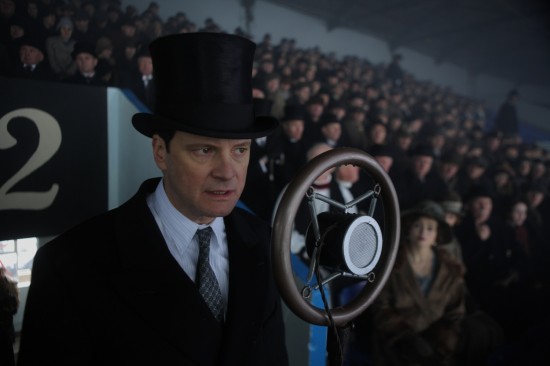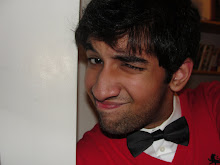
With Oscar ballots due just tomorrow. we're drawing to a close of what was one of the noisiest, most convoluted, and probably ridiculous Oscar seasons that I've ever paid attention to. Makes me long for those inspiring 2002 days where Hayao Miyazaki, Pedro Almodovar, Roman Polanski, Eminem and Michael Moore, among many other deserving names, all became Oscar winners. Then again, that night was rubber-stamped by an oddly populist choice of Chicago for the final win. Will the wealth be nearly so shared this year? We did go from unprecedented sweep to unprecedented sweep this year between The Social Network becoming the winningest film as long as there's been this magnitude of critics' organizations handing out awards across the country to The King's Speech all of a sudden coming in and sweeping every possible major precursor with voting overlap (that is, the guilds for Producers, Actors, and Directors, and the British Academy). It seems like the 90s all over again; Goodfellas vs. Dances with Wolves, Pulp Fiction vs. Forrest Gump, Fargo vs. The English Patient, LA Confidential vs. Titanic, and so on and so forth.
We started with the National Board of Review handing out their awards to kickoff the official start to the critical precursor season, which almost always looks pretty different to the second half of the overall season but has bore a striking resemblance to it the past few years with films like The Hurt Locker, Slumdog Millionaire and No Country for Old Men dominating both sectors. And it looked like another film was following in its path, with The Social Network winning more awards than any of them. The Hurt Locker, like The Social Network, had swept the three most prestigious ones in Los Angeles, New York, and the National Society. But the number of Best Picture, Director, and Screenplay prizes that The Social Network lost from any of the dozens of critics groups in the country could be literally counted on your own fingers. With a 95 score on metacritic, as high of a score one could possibly receive for a movie that mainstream, it seemed reasonable that this was simply a film that critics had liked the best in a very long time.

The National Board of Review did a spectacular job, in my opinion (where they're otherwise hit or miss), by rewarding The Social Network in Picture, Director, and Screenplay, and handing out their acting prizes to Jesse Eisenberg, Lesley Manville, Christian Bale and Jacki Weaver. As good of choices as you can possibly get. I was positively giddy at the prospect of this awards season. Unfortunately, this year turned out to be a precise opposite of conventional years where the critics are usually far more inspired than who the NBR hands their prizes out to. Besides the obvious Social Network love, it seemed as if the critics, again (but now more than ever), were more concerned with prognosticating the Oscars rather than voting with the convictions of their own tastes. Largely, this can't be said of the three major bodies who, for example, split their Actress prizes between Kim Hye-ja, Annette Bening and Giovanna Mezzogiorno, but aren't critics the ones who are supposed to give boosts to people like Lesley Manville? Lead OR supporting? Did they really find performances like Noomi Rapace's to be better than Manville's? Not according to her reviews. Critics aren't a mysterious block of people like the Academy, one could legitimately look back to the consensus formed by their reviews to see how they really feel. Did they really feel that Hailee Steinfeld was a supporting actress in True Grit? Clearly, not, but plenty of them still had no problem giving her their Supporting prizes as if they were suddenly slave to campaign narratives.
Critics got carried away with the past few years where the Academy happened to agree with them, and suddenly want to act as if they are some sort of legitimate buzz-maker for all the contenders this year. That's not who they are. At their best, critics spotlight certain films and performances that otherwise would have gone ignored either without their help or even with it — at least they still would have recognized those deserving players this year at all. Either they'd give due recognition to films like Mulholland Dr. or they'd help a film like Sideways in its quest for unlikely Oscar glory. Now, with more critics awards bodies more than ever, this impact could have been amplified in the most helpful way possible. They used to almost never align with the Academy, but that wasn't the point. Arguably the most inspired decision from the Academy was a nomination to Javier Bardem in Biutiful, yet he's the one performance nominated from their choices that garnered little to no recognition from the critics groups beforehand for whom that should be a no-brainer. But critics decided en masse to vote for Colin Firth, as if to make up for their largely ignoring him last year for the more deserving A Single Man (a business they should not be getting into at all) with the occasional bone-throwing to Jesse Eisenberg. But the fact remains that there should have been more variety, especially among the gamut of deserving arthouse performances this year that they did ignored in a very obvious ploy to give themselves an air of self-importance that never existed in the first place.

So now we're in a place where the Academy may have even reacted retroactively to this block of critical consensus in their awards, and The Social Network came away with little more than a Editor's guild award and a few consolation prizes from the Sound Editors. I would say that the behavior of critics this year, as evidenced by snubs like Lesley Manville, in particular (and this may just be symptomatic of my own favoritism, but there are very few people I've ever met who have watched her performance who would label her as anything less than spectacular), is the most shameful legacy of this awards season. And now we see just how little the critics matter after all, with the state of the race looking drastically different than it did just a few months ago. Black Swan and The King's Speech join the likes of True Grit, Toy Story 3, and Inception to be the only Picture nominees to earn more than $100 million at the box office, while The Social Network settled with the not bad $90-something million (although it seems strange that a film skewing that young, with those credentials, makes less money than R-rated Black Swan or The King's Speech).
Now, people seem pretty bitter than The King's Speech has stolen the momentum of The Social Network. It was rather all of a sudden, and, hilariously, after more loud complaints of people moaning that it was boring that The Social Network was winning everything. I guess no one can ever win in this game, can they? Regardless, I'm one in the camp who would much prefer a Social Network win next Sunday night over the more vanilla, expected, conventional choice of The King's Speech. That being said, some of the hyperbole thrown at The King's Speech by its critics are more than a little ridiculous. Like people trying to ridicule Tom Hooper as a TV director for having made John Adams, as if that weren't an utterly masterful creation. Likening it to Masterpiece Theater, although quite a few entries into Masterpiece Theater would likely have been similarly awards-sweeping pictures. With the general uptick of quality in TV programming, it's very very difficult to try and criticize a film by likening it to TV quality. Besides that, Tom Hooper has been on the inside trail for months now being nothing if not utterly charming. Not to mention speaking of his own film with a refreshing candidness, calling the original poster for the film a "train smash" and making a point to refuse to cut his film to salvage a PG-13 rating. It's no surprise to me that he's in the running to win for Directors since he's very good at playing the insiders' game, and everyone shocked that he might is very clearly outside of that "inside."

It does seem strange after such a string of gritty, non-conventional fare being chosen by the Academy that they suddenly go with a film that's such an easy lob down the middle. It seems like it would simply seem too quaint. But what happened? It's not a very political game, I actually think Harvey Weinstein had very little to do with it himself. People do simply legitimately love it, whether in Hollywood or among mainstream audiences. It has a little bit of everything for everyone, which you can see when compared to some of its competitors. For example, Scott Rudin tried to sell as The Social Network's selling point that it's a film for its ages; encapsulating an age in which communication is vastly transformed by this new medium of technology. Well, sure, but in much of the same way as politics and mass media was transformed by the advent of radio which King George must himself learn to master before being an effective public servant. People relate to Black Swan in Nina's strive for perfection in performance, while The King's Speech deals with the same theme of self-consciousness in a form of performing art in its own right. The Fighter depicts a dynamic relationship between a champion and a more charming and enigmatic older brother who tends to steal the spotlight, a relationship comparable to that between King Edward who abdicates his throne to King George. An unlikely relationship at the center of True Grit between Rooster Cogburn and Mattie Ross is at the center of The King's Speech between King George and Lionel Logue. Even the social stigma against the central characters of The Kids Are All Right can be compared to that of the stuttering King George. It's a royal costume drama, a period piece, a biopic, World War II is central to its plot, hints at the Holocaust, depicts a disability, it just ticks off all the boxes people like to see in their films. And it's not on purpose, a conscious measure on the part of screenwriter David Seidler, that's simply the way events transpired.
And now we're here.

No comments:
Post a Comment